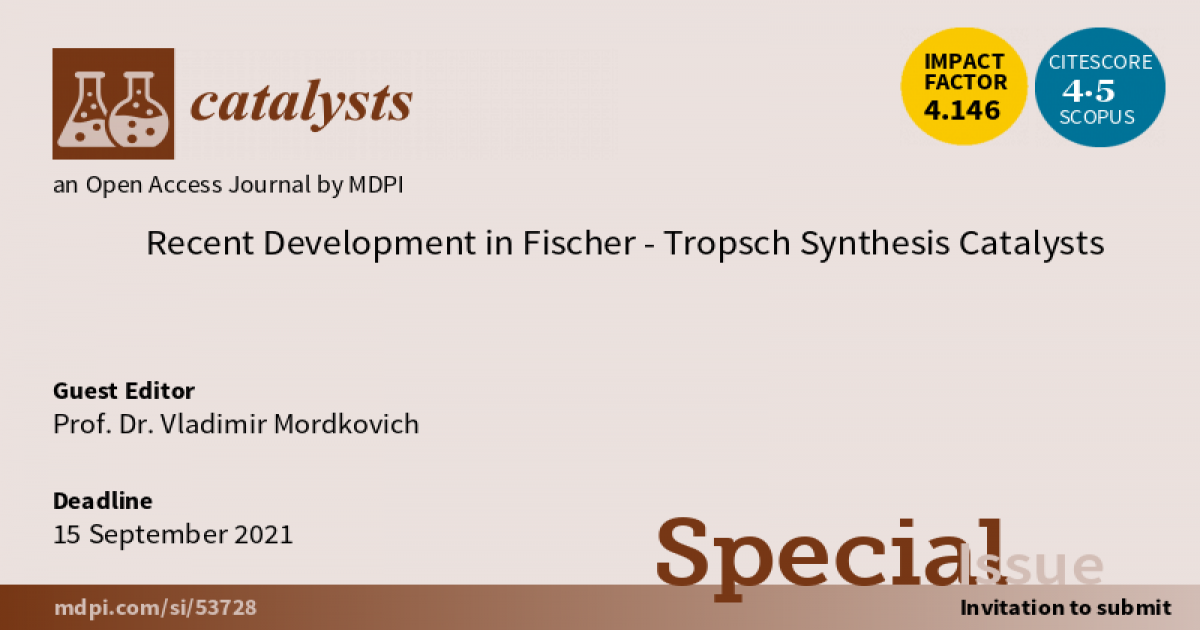Recent Development in Fischer-Tropsch Synthesis Catalysts
A special issue of Catalysts (ISSN 2073-4344). This special issue belongs to the section "Catalysis in Organic and Polymer Chemistry".
Deadline for manuscript submissions: closed (15 September 2021) | Viewed by 10967

Special Issue Editor
Interests: heterogeneous catalysis; Fischer–Tropsch synthesis; alternative fuels; chemistry of materials; carbon nanostructures
Special Issues, Collections and Topics in MDPI journals
Special Issue Information
Dear Colleagues,
This year we mark the hundredth anniversary of the discovery of Fischer–Tropsch synthesis (FTS). Moving into the second century of FTS research, the scientific community is meeting new challenges due to both novel scientific aspects of this inexhaustible chemistry and to earlier unforeseen ecological circumstances. For instance, the opportunities afforded by quantum chemistry calculations and CFD modeling open the way for unimaginably accurate theoretical predictions of catalyst behavior. On the other hand, the introduction of innovative techniques of catalyst particle/granule/bed manufacturing, like molecular organic frameworks or heat-conductive frames of microchannels, allow achieving unprecedented operational parameters for prospective industrial processes. This era of new interest has brought to life such new lines of development as hybrid catalysts, nano-effect-driven catalysis, high carbon efficiency technologies, and non-fuel Fischer–Tropsch products, to name but a few.
The aim of this Special Issue is to cover promising recent research and novel trends in Fischer–Tropsch synthesis catalysts. Contributions from all areas of fundamental and applied catalysis science and technology, based on experimental results and/or mathematical modeling, would be of great interest.
Prof. Dr. Vladimir Mordkovich
Guest Editor
Manuscript Submission Information
Manuscripts should be submitted online at www.mdpi.com by registering and logging in to this website. Once you are registered, click here to go to the submission form. Manuscripts can be submitted until the deadline. All submissions that pass pre-check are peer-reviewed. Accepted papers will be published continuously in the journal (as soon as accepted) and will be listed together on the special issue website. Research articles, review articles as well as short communications are invited. For planned papers, a title and short abstract (about 250 words) can be sent to the Editorial Office for assessment.
Submitted manuscripts should not have been published previously, nor be under consideration for publication elsewhere (except conference proceedings papers). All manuscripts are thoroughly refereed through a single-blind peer-review process. A guide for authors and other relevant information for submission of manuscripts is available on the Instructions for Authors page. Catalysts is an international peer-reviewed open access monthly journal published by MDPI.
Please visit the Instructions for Authors page before submitting a manuscript. The Article Processing Charge (APC) for publication in this open access journal is 2200 CHF (Swiss Francs). Submitted papers should be well formatted and use good English. Authors may use MDPI's English editing service prior to publication or during author revisions.
Keywords
- Fischer–Tropsch synthesis
- hybrid catalysts
- bifunctional catalysts
- cobalt
- iron
- ruthenium
- metal organic frameworks
- nano-effects
- mechanism
- active site
- fixed bed
- slurry bed
- microchannel
- selectivity
- deactivation
- regeneration
- alternative fuel
Benefits of Publishing in a Special Issue
- Ease of navigation: Grouping papers by topic helps scholars navigate broad scope journals more efficiently.
- Greater discoverability: Special Issues support the reach and impact of scientific research. Articles in Special Issues are more discoverable and cited more frequently.
- Expansion of research network: Special Issues facilitate connections among authors, fostering scientific collaborations.
- External promotion: Articles in Special Issues are often promoted through the journal's social media, increasing their visibility.
- Reprint: MDPI Books provides the opportunity to republish successful Special Issues in book format, both online and in print.
Further information on MDPI's Special Issue policies can be found here.





